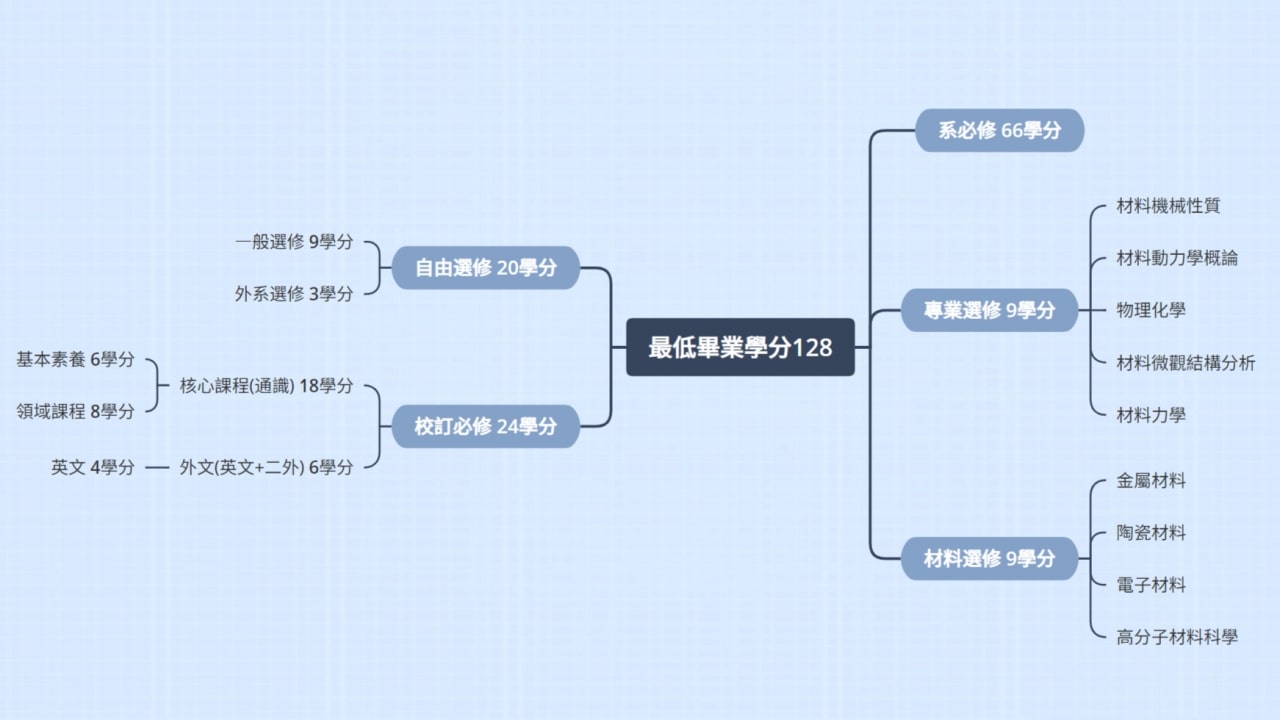Course Introduction





At National Yang Ming Chiao Tung University, students in the Materials Science Department can encompass not only but learning about the structure, properties, and interactions of materials. The field of materials engineering is quite broad. Industries such as information technology, communications, electromechanics, energy, chemical materials, defense, and daily life all rely on the foundation of materials science. Furthermore, the production and manufacturing of any product requires materials. Many bottlenecks in the creation of key components across various fields can only be resolved through the development of new materials or the improvement of material processing. As such, materials engineering professionals are in high demand in the industry, and thus, the materials engineering field is unlikely to become obsolete.
>Features of the Materials Science Curriculum at National Yang Ming Chiao Tung University
- Flexible Course Options
Only 66 credits are required as mandatory courses by the department, providing students with great freedom in course selection.
- Flexible Course Options
- Triple Program
The interdisciplinary program cooperatively offered by the Departments of Materials Science, Optoelectronics, and Electrical Physics is designed for students who have not yet determined their specific interests. It allows them to explore courses across the College of Engineering, College of Electrical Engineering, and College of Science, helping them discover their passions and talents, while fostering cross-disciplinary expertise in materials, optoelectronics, and electronic physics. The program includes ten modular courses, from which students can choose three (or more) based on their interests. Students enrolled in the Triple Program only need to complete 38 mandatory credits for the Materials Science Department, while the flexible cross-disciplinary modular courses help strengthen the development of a second area of expertise.
- Triple Program
1. Electronic Physics: The collaboration between the Department of Electronic Physics and the Department of Materials Science mainly focuses on semiconductors. The expertise in quantum theory from the Department of Electronic Physics complements the semiconductor processing knowledge from the Department of Materials Science, allowing students from both departments to understand the relationship between the processing aspects and the theoretical foundations of the semiconductor industry.
2. Optoelectronics: The Department of Optoelectronics, in studying the properties of light and electricity, often requires advanced and superior materials for support. The knowledge gained in the Department of Materials Science can be applied effectively, particularly in areas like optoelectronic semiconductors and solar panels, which are fields where collaboration between the Department of Optoelectronics and the Department of Materials Science can thrive.
3. Materials: The role of the Department of Materials Science and Engineering in the Triple Program is to help students understand the relationship between material structures and properties, as well as the manufacturing processes of materials. Depending on their research interests, students can choose relevant courses and integrate the knowledge from the Departments of Electronic Physics and Optoelectronics.
Introduction to the Core Requirements of the Materials Science Department
Introduction to Materials Science and Engineering
- Time: First Year
- Credits: 6 credits in total, split across both semesters
- Course Description: The theoretical foundations of materials science, covering the basic concepts of materials science and materials engineering. The course content will include atomic structure, material microstructure, mechanical properties, optical and thermal properties, material defects, phase diagrams, strengthening mechanisms, and more. This will lay the groundwork for future studies in materials science, providing essential prerequisite knowledge. The course will also provide an overview of the basic science and applications of ceramic materials, polymer materials, electronic materials, magnetic materials, composite materials, and semiconductors.
- Click here to view OCW
Materials Thermodynamics
- Time: Second Year
- Credits: 6 credits in total, split across both semesters
- Course Description: The first semester focuses on the fundamentals of the three laws of materials thermodynamics. Materials Thermodynamics II will extensively apply the three key thermodynamic concepts learned in Materials Thermodynamics I to unit and multi-phase equilibrium, gas molecular behavior, solution behavior, and more.
- Click here to view OCW
Physical Metallurgy
- Time: Second Year
- Credits: 6 credits in total, split across both semesters
- Course Description: This course covers the basic applications of phase diagrams, diffusion behavior, nucleation and growth, as well as phase transformation behavior. It also discusses various material analysis methods and their applications. Upon completing this course, students will be able to explain fundamental metallurgical phenomena, distinguish the composition and properties of different alloys, and understand the properties of metal structures.
Introduction to Crystal Structures and Diffraction
- Time: Second Year
- Credits: 3 credits, only in the second semester
- Course Description: This course primarily covers the following topics: 1. The basic crystallography concepts, including the symmetry, classification, point groups, and space groups of crystal structures, as well as important crystal structures. 2. Introduction to X-ray sources, the construction of reciprocal lattices, the basic principles of X-ray diffraction, and various fundamental applications of X-ray diffraction in materials analysis.
Introduction to Computer Science
- Time: Second Year
- Credits: 3 credits, only in the first semester
- Course Description: Programming has become a common skill in the engineering field, and materials science often uses programming to simulate the microscopic structure and properties of materials. This course is therefore a mandatory requirement for the department. In this course, students will have hands-on opportunities to become familiar with Python syntax.
Basic Materials Laboratory
- Time: Second Year
- Credits: 6 credits in total, split across both semesters
- Course Description: Students will apply the theoretical knowledge learned in class to conduct a series of materials experiments, covering areas such as metallography and electrochemistry.
Materials Engineering Laboratory
- Time: Third Year
- Credits: 6 credits in total, split across both semesters
- Course Description: This is a more advanced laboratory course. In this class, students will learn polymer synthesis, preparation, and characterization, as well as the analysis of the optical and electrical properties of polymers.
>Course Map


